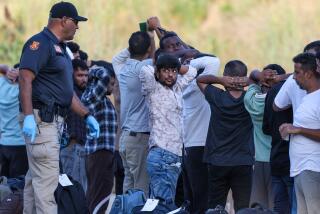Lawmakers Assail Bush on Coordination Efforts : Panels Charge Inefficiency in Drug War
WASHINGTON â The nationâs border war against drug smugglers, coordinated by Vice President George Bush, is riddled with inefficiency and lack of resources, congressional investigators who inspected installations nationwide charged Tuesday.
Two years after the National Narcotics Border Interdiction System was created to coordinate the efforts of various drug enforcement agencies, the operation is nothing more than âpublic relations and promotionsâ for Bush, Sen. Dennis DeConcini (D-Ariz.) asserted. He said he based his conclusions on reports by investigators from both Senate and House subcommittees.
âHat Trick IIâ
Several officials of the drug interdiction system disputed the charges, however, and one said that the office had been âon a learning curve the first yearâ and had improved since. They cited, for example, the agencyâs recent announcement of âHat Trick II,â a massive drive against illegal drugs being imported from the Caribbean.
But despite such operations, the investigators, who recently traveled to systemwide offices from California to Miami, said that they found officials who were unsure of their missions and who could muster little cooperation among drug-fighting agencies that compete for publicity. Moreover, the system is of little help in resolving the difficulties, the investigators said.
Indeed, the ineffectiveness of the system is such that it âmakes me wonder if the vice presidentâs office isnât the garbage disposal for unwanted issues,â said Rep. Glenn English (D-Okla.), whose House Government Operations subcommittee on government information, justice and agriculture was among the panels that conducted the probe.
âI Take the Fifthâ
One U.S. Customs Service official, asked if he expected Bush to help the agency, responded tersely: âI take the Fifth,â referring to the Fifth Amendment, which prohibits self-incrimination.
The criticism by Englishâs subcommittee and the Senate Appropriations subcommittee on the Treasury, postal service and general government, of which DeConcini is the ranking minority member, is the latest in a series of blows that have been dealt to the drug interdiction system.
Last summer a General Accounting Office report asserted that the systemâs role of coordinating the efforts of the Customs Service, the Coast Guard and the Drug Enforcement Administration âfell far short of what is needed to substantially reduce the flow of drugs into the country.â
The subcommittee investigators were particularly harsh in their assessment of the drug fight in the agencyâs Western region, one of six. Some federal officials believe that the region, which includes California, Washington and Oregon, is rapidly gaining favor among drug smugglers and money launderers who are being pushed out of the Southeast. A resurgence of Mexican-grown marijuana also is an increasing problem, they said.
Make Due With Binoculars
In one case, the investigators said, a huge âmother shipâ loaded with drugs lay off the California coast, observed by a lone customs agent equipped only with binoculars instead of radar. Eventually, the ship slipped into harbor and disgorged its load unimpeded, they said.
âAttention has been focused on the Southeast,â one investigator declared. âMeanwhile, the West has been as naked as a newborn baby.â
The Customs Service is responsible for air border interdictions and for sea interdictions up to 12 miles from shore. But, according to the investigators, the service is hardly capable of doing its job.
From San Diego to Brownsville, Tex., the service has 11 boats, two long-range turboprop airplanes, two jets and two Black Hawk helicopters, one investigator said. âThe rest of their aircraft is just junk,â he added.
DeConcini complained that Bush, as the leader of the system, should âcrack heads and force agencies to work together.â But he cannot do that, the senator remarked sarcastically, because he âhas a lot of funerals to go toâ and thus cannot make drug-fighting efforts a full-time job.
âRisk Assessmentsâ
Meanwhile, customs officials said they are conducting ârisk assessmentsâ to determine the extent of the smuggling threat in the West.
One Administration official said the assessments are necessary because the threat âis static and changes on a daily basis.â The subcommittee investigators said customs officials have told them they estimate that smugglers make 460 drug runs across the nationâs Southwestern border every month.
William J. Meglen, assistant regional customs commissioner for enforcement in the Pacific region, said seized cash is âthe most solid indicatorâ that the threat is increasing. Customs officials said that in fiscal 1985, which ended Sept. 30, $26.2 million was confiscated in the Pacific region, compared to $16.6 million in fiscal 1984.
More to Read
Get the L.A. Times Politics newsletter
Deeply reported insights into legislation, politics and policy from Sacramento, Washington and beyond. In your inbox three times per week.
You may occasionally receive promotional content from the Los Angeles Times.










